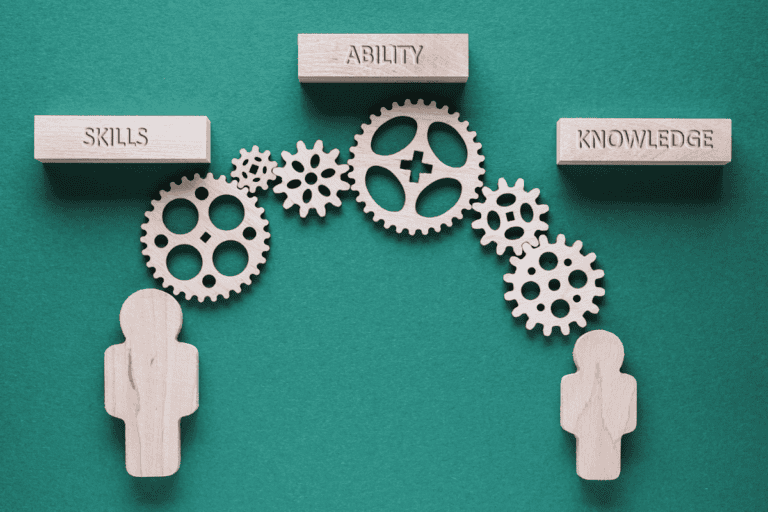What Is Collaboration Skills?
Collaboration skills are like the threads that weave together a tapestry of successful teamwork. Understanding the intricacies of collaboration involves more than just working alongside others; it's about harmonizing diverse skills and perspectives towards a common goal.
As you navigate through the nuances of collaboration, you'll uncover the key elements that make teams thrive and achieve remarkable outcomes. Stay tuned to discover how honing these skills can revolutionize your approach to working with others and drive collective success.
Key Takeaways
- Collaboration skills are essential for success in interconnected work environments.
- Effective communication and feedback are crucial for fostering collaboration.
- Overcoming challenges and problem-solving together strengthen collaborative efforts.
- Creating a collaborative environment involves trust, open communication, and fostering creativity.
Importance of Collaboration Skills
Understanding the significance of collaboration skills is important in today's interconnected and fast-paced work environment. Team dynamics play a critical role in the success of any project. When individuals come together to work towards a common goal, their ability to collaborate effectively can determine the outcome. In group projects, each team member brings a unique set of skills and perspectives to the table. By working collaboratively, team members can leverage these differences to innovate, problem-solve, and achieve better results than they could individually.
Effective collaboration skills are essential for maneuvering the complexities of group projects. When team dynamics are strong, communication flows smoothly, roles are defined clearly, and conflicts are resolved constructively. By fostering a collaborative environment, teams can enhance creativity, productivity, and overall performance. Developing these skills not only benefits the team but also the individual, as they learn to adapt to different working styles, communicate more effectively, and build stronger relationships with colleagues.
Definition and Scope
When it comes to collaboration skills, understanding the definition and scope is vital for success in any team setting.
By defining what collaboration entails and its scope within a project or organization, you can establish clear expectations and goals.
This clarity sets the stage for effective communication, coordination, and leveraging the benefits of teamwork.
Importance of Collaboration
Collaboration plays a pivotal role in fostering innovation and achieving collective goals within a team or organization. Effective team dynamics, important for problem-solving, are enhanced through collaboration. By working together, team members can combine their unique skills and perspectives to tackle complex challenges more efficiently.
Moreover, collaboration fosters group cohesion, leading to increased trust and communication among team members. This cohesion is instrumental in ensuring project success, as it promotes a shared sense of responsibility and accountability. When individuals collaborate effectively, they leverage diverse strengths to drive creativity and achieve common objectives.
Basically, the importance of collaboration lies in its ability to harness the collective intelligence and capabilities of a team to accomplish tasks and propel organizational growth.
Benefits of Teamwork
Three key benefits of teamwork encompass increased productivity, enhanced creativity, and improved problem-solving skills within a group setting. When individuals collaborate effectively, they leverage each other's strengths, leading to a more efficient workflow and higher output. Additionally, the synergy created by different perspectives fosters a more innovative environment where new ideas flourish. Teamwork also enhances problem-solving skills as diverse viewpoints can identify solutions that a single individual might overlook. Understanding group dynamics and promoting team building are essential for unleashing these benefits fully. By nurturing a culture of collaboration, organizations can harness the power of teamwork to drive success and achieve goals more effectively.
| Benefits of Teamwork | Description |
|---|---|
| Increased Productivity | Combining efforts to achieve more in less time. |
| Enhanced Creativity | Fostering an environment where new ideas can thrive. |
| Improved Problem-Solving Skills | Leveraging diverse perspectives to find effective solutions. |
Benefits in Professional Settings
In professional settings, the advantages of effective collaboration become evident through increased productivity and innovative problem-solving strategies. When team members work together seamlessly, the results can be transformative. Here are some key benefits of collaboration in professional environments:
- Enhanced Team Dynamics: Collaborating allows team members to leverage each other's strengths, leading to a more cohesive and efficient work environment.
- Improved Problem-Solving Strategies: Different perspectives and expertise coming together often result in more creative and effective solutions to complex challenges.
- Enhanced Conflict Resolution and Leadership Development: Collaborating teaches individuals how to navigate disagreements constructively, leading to stronger conflict resolution skills and fostering leadership qualities among team members.
Impact on Team Performance
When it comes to team performance, understanding the importance of team synergy and how collaboration boosts productivity are essential.
These points highlight the critical role that effective collaboration plays in driving success within a team environment.
Team Synergy Importance
Effective team synergy greatly influences the overall performance of a team, showcasing the power of collaboration and unity in achieving collective goals. When team members synergize effectively, they propel the team towards success through enhanced productivity and cohesion. Here's why team synergy is vital:
- Enhanced Communication: Synergy fosters open communication channels, allowing for the smooth flow of ideas and information among team members.
- Improved Problem-Solving: By leveraging diverse perspectives and skills, team synergy enables more innovative and effective problem-solving approaches.
- Heightened Motivation: The sense of camaraderie and mutual support that comes with team synergy boosts motivation levels, inspiring team members to give their best.
In essence, team synergy serves as the cornerstone of a high-performing team, driving success through collaboration and shared objectives.
Collaboration Boosts Productivity
Team synergy's impact on productivity directly correlates with enhanced collaboration, elevating overall team performance to new heights. Effective collaboration within a team can greatly improve team dynamics, leading to increased workplace success.
When team members work together seamlessly on group projects, they can leverage each other's strengths, resulting in a more efficient and productive work environment. By fostering a culture of collaboration, teams can enhance their problem-solving abilities, creativity, and innovation.
Additionally, collaboration plays an important role in team building, fostering strong relationships among team members and creating a sense of unity and common purpose. Ultimately, a collaborative team environment is essential for driving productivity and achieving success in today's fast-paced work settings.
Enhancing Communication
To enhance communication effectively in collaborative settings, you must actively listen and provide clear, concise feedback. Improving relationships and building trust are vital components of successful collaboration. Here are three key strategies to enhance communication in a collaborative environment:
- Practice Active Listening: Engage fully with the speaker, focus on their words, and demonstrate your understanding by paraphrasing their message. This shows respect and helps avoid misunderstandings.
- Guarantee Clarity in Communication: Be direct and specific in your messages to avoid confusion. Use simple language, ask questions for clarification, and encourage open dialogue to foster a clear exchange of ideas.
- Provide Constructive Feedback: Offer feedback that's specific, actionable, and focused on behaviors rather than personal traits. This helps in addressing issues effectively and promotes continuous improvement within the team.
Overcoming Challenges Together
Overcoming challenges collaboratively requires a proactive approach to problem-solving and a shared commitment to finding solutions. When facing obstacles as a team, building trust is essential. Trust forms the foundation for effective collaboration, enabling team members to rely on each other's abilities and intentions. Without trust, problem-solving efforts can be hindered by doubt and uncertainty, leading to delays or even failure in overcoming challenges.
Effective problem solving within a team involves clear communication and active listening. By openly discussing the issues at hand and considering diverse perspectives, teams can leverage the collective intelligence and creativity of all members. Encouraging a culture where everyone feels comfortable sharing their ideas fosters innovation and increases the likelihood of finding successful solutions.
Moreover, when challenges arise, it's important to approach them with a positive mindset. Viewing obstacles as opportunities for growth and learning can motivate the team to persevere and remain committed to overcoming difficulties together. By maintaining a solution-oriented outlook and supporting each other throughout the problem-solving process, teams can navigate challenges more effectively and achieve success collaboratively.
Cultivating a Collaborative Environment
Cultivating a collaborative environment hinges on fostering trust and open communication among team members to enhance problem-solving capabilities. Building relationships is a key aspect of creating a strong collaborative environment.
Encouraging team members to get to know each other on a personal level can lead to increased trust and better teamwork. Additionally, fostering creativity within the team is essential for collaboration to thrive.
Encouraging team members to think outside the box and share their ideas freely can lead to innovative solutions to complex problems. Finally, creating a supportive and inclusive atmosphere is vital for cultivating collaboration.
When team members feel valued and respected, they're more likely to contribute their thoughts and ideas, leading to a more dynamic and productive team environment. By prioritizing trust, open communication, relationship-building, creativity, and inclusivity, you can create a collaborative environment where teams can excel together.
Conclusion
So, now that you know all about collaboration skills, go ahead and try them out in your workplace. Remember, teamwork makes the dream work!
Don't worry about any obstacles that may come your way, just join hands and tackle them together.
Keep those communication lines open and watch your team's performance soar to new heights.
Who knew that working together could be so beneficial? Keep collaborating and watch the magic unfold!







